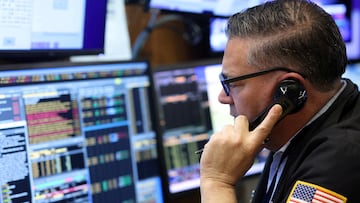How does the CPI affect the stock market? Does it affect bitcoin and other cryptos?
The rate of consumer inflation, reported each month, surged last year forcing the Federal Reserve to act which affected other financial assets.

Inflation has been running at a higher-than-normal pace hitting highs not seen since the 1980s. Surging prices were pushed by a number of factors resulting from the covid-19 pandemic including supply chain disruptions and economic policies to shore up the economy as it plummeted into recession.
This prompted the Federal Reserve to take action through tightening fiscal policy and aggressive rate hikes to bring inflation under control. While the measures were expected, they had their own knock-on effects reducing liquidity and making borrowing costs more expense.
However, policymakers caught investors and markets off guard when they began a series of higher-than-expected interest rate hikes, in the end four back-to-back three quarters of a percentage point, which rippled through the various facets of the economy and sparked fears of a recession.
Nowadays though, more economic experts and investors are betting that the Federal Reserve will manage a soft landing, where the economy will avoid a recession but that growth will come to a halt. That is the reason why markets and investors have been watching the monthly consumer price index (CPI) reports so closely over the past several months.
They are hoping that each successive one shows that inflation is being brought to heel and that the pandemic-induced disruptions are being ironed out. Which would mean the Federal Reserve will temper its policies on tackling inflation. Here’s a look at how that has affected the markets.
Our #CPI indicators update tomorrow. Our #inflation nowcasting model (updated daily!) predicts year-over-year CPI #inflation of 6.64% for December. Check it out: https://t.co/qXCmAZQfCn pic.twitter.com/E5RMmYWjXh
— ClevelandFed (@ClevelandFed) January 11, 2023
The link between stocks, inflation, and interest rates
Inflation is the measure of how much prices are increasing over the space of a year. If the value is high, such as that has been seen over the past year, then central banks are likely to take certain measures to steer inflation toward their target. At present, the Federal Reserve aims for a 2 percent year-on-year inflation gain.
When inflation is as high as it has been, the Fed will, and has, raised interest rates. This measure means borrowing money suddenly gets a whole lot more expensive. With the highest interest rates since the 2008 financial crash, businesses are being incentivised to take less financial risks and save money. If this goes the way the Fed is planning, while not ideal for everyone, a recession more often than not ensues putting thousands of workers at risk of losing their job.
Stock markets usually aren’t affected too much by the inflation data but can be since higher interest rates can cause business activity to slow. The result of less investment and lower profits for companies as consumers spend less. Investors worried they will get less returns on their assets sell sending the value of stocks lower.
Stock markets have already witnessed a bear market, when a market has dropped 20 percent or more from a high for a sustained period of time, and further expected raises above what the market is predicting would likely force stock prices lower.
Crypto since 2021.#AFPGraphics chart shows the decline of the total cryptocurrency market cap in 2022 pic.twitter.com/T21rK9kUFn
— AFP News Agency (@AFP) January 12, 2023
What does this mean for cryptocurrency?
Related stories
A lean investment market will mean lean cryptocurrency investments. What is of particular concern is the cryptocurrency market in and of itself. In comparison to November 2021, crypto values have been plummeting. Record bitcoin highs of nearly $70,000 have given way to prices that have fallen below the $20,000 dollar mark since November.
The entire cryptomarket was worth around $3 trillion when bitcoin was at its peak. With future regulation looming, the collapse of digital coins, exchanges going bankrupt and scandals such as FTX, the year has certainly been a tough one for cryptocurrency.

